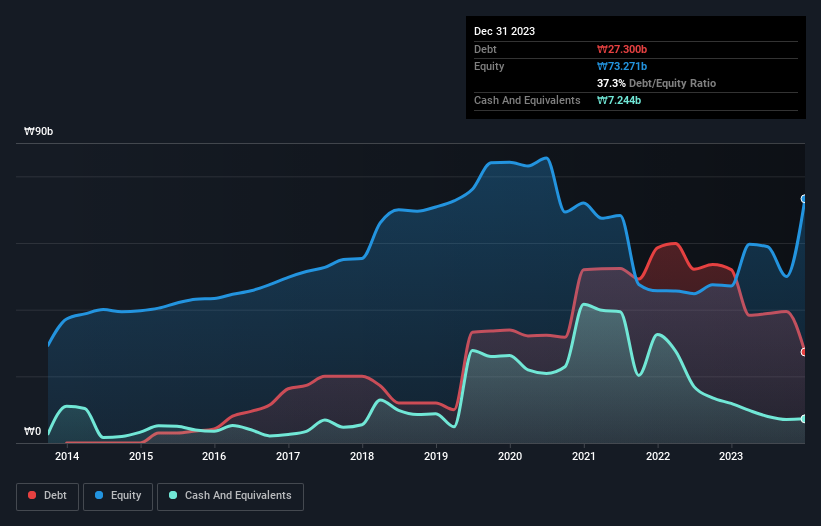
Some say volatility, rather than debt, is the best way to think about risk as an investor, but Warren Buffett famously said that 'Volatility is far from synonymous with risk.' It's only natural to consider a company's balance sheet when you examine how risky it is, since debt is often involved when a business collapses. We note that HansBiomed Corporation (KOSDAQ:042520) does have debt on its balance sheet. But is this debt a concern to shareholders?
Why Does Debt Bring Risk?
Generally speaking, debt only becomes a real problem when a company can't easily pay it off, either by raising capital or with its own cash flow. If things get really bad, the lenders can take control of the business. While that is not too common, we often do see indebted companies permanently diluting shareholders because lenders force them to raise capital at a distressed price. Of course, the upside of debt is that it often represents cheap capital, especially when it replaces dilution in a company with the ability to reinvest at high rates of return. When we think about a company's use of debt, we first look at cash and debt together.
See our latest analysis for HansBiomed
What Is HansBiomed's Net Debt?
You can click the graphic below for the historical numbers, but it shows that HansBiomed had ₩27.3b of debt in December 2023, down from ₩52.0b, one year before. However, because it has a cash reserve of ₩7.24b, its net debt is less, at about ₩20.1b.

How Healthy Is HansBiomed's Balance Sheet?
We can see from the most recent balance sheet that HansBiomed had liabilities of ₩42.7b falling due within a year, and liabilities of ₩4.72b due beyond that. Offsetting these obligations, it had cash of ₩7.24b as well as receivables valued at ₩13.3b due within 12 months. So its liabilities outweigh the sum of its cash and (near-term) receivables by ₩26.9b.
Of course, HansBiomed has a market capitalization of ₩186.8b, so these liabilities are probably manageable. Having said that, it's clear that we should continue to monitor its balance sheet, lest it change for the worse. The balance sheet is clearly the area to focus on when you are analysing debt. But it is HansBiomed's earnings that will influence how the balance sheet holds up in the future. So when considering debt, it's definitely worth looking at the earnings trend. Click here for an interactive snapshot.
Over 12 months, HansBiomed saw its revenue hold pretty steady, and it did not report positive earnings before interest and tax. While that's not too bad, we'd prefer see growth.
Caveat Emptor
Over the last twelve months HansBiomed produced an earnings before interest and tax (EBIT) loss. Indeed, it lost ₩3.4b at the EBIT level. Considering that alongside the liabilities mentioned above does not give us much confidence that company should be using so much debt. So we think its balance sheet is a little strained, though not beyond repair. Another cause for caution is that is bled ₩4.7b in negative free cash flow over the last twelve months. So to be blunt we think it is risky. The balance sheet is clearly the area to focus on when you are analysing debt. However, not all investment risk resides within the balance sheet - far from it. We've identified 2 warning signs with HansBiomed (at least 1 which is significant) , and understanding them should be part of your investment process.
When all is said and done, sometimes its easier to focus on companies that don't even need debt. Readers can access a list of growth stocks with zero net debt 100% free, right now.
Valuation is complex, but we're here to simplify it.
Discover if HansBiomed might be undervalued or overvalued with our detailed analysis, featuring fair value estimates, potential risks, dividends, insider trades, and its financial condition.
Access Free AnalysisHave feedback on this article? Concerned about the content? Get in touch with us directly. Alternatively, email editorial-team (at) simplywallst.com.
This article by Simply Wall St is general in nature. We provide commentary based on historical data and analyst forecasts only using an unbiased methodology and our articles are not intended to be financial advice. It does not constitute a recommendation to buy or sell any stock, and does not take account of your objectives, or your financial situation. We aim to bring you long-term focused analysis driven by fundamental data. Note that our analysis may not factor in the latest price-sensitive company announcements or qualitative material. Simply Wall St has no position in any stocks mentioned.
About KOSDAQ:A042520
HansBiomed
Engages in the research and development, production, and sale of medical materials for the procedure and the raw materials for medical supplies.
Mediocre balance sheet and slightly overvalued.
Similar Companies
Market Insights
Community Narratives



